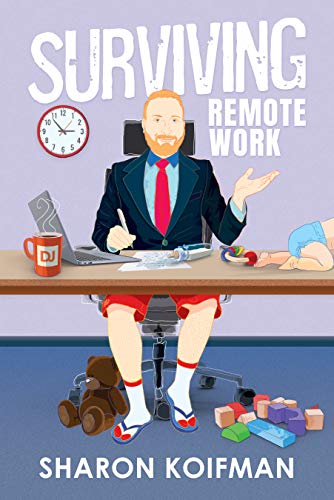Through his job placement service DistantJob, Sharon Koifman has consistently advocated for remote work. He’s been a believer in remote employees for 20 years, claiming that they produce more because they are happier and healthier. Surviving Remote Work: How to Thrive as a Leader and Entrepreneur in the Remote Age, his business book, provides evidence that this is the case. Koifman, leveraging his executive search expertise through DistantJob, supports leaders who need to undertake what may appear to be a significant and costly shift in their business processes and culture. This experience uniquely positions him to advocate for remote work as both a recruitment strategy and a way to enhance company culture.
The author speaks to both bosses and employees preparing to embark on the crazy journey we call “working from home” during 2020’s summer lockdown. That wasn’t his intention at all. He intended to write a book about how to construct distributed teams and embrace remote management, then discovered:
What the pandemic has given us is the opportunity to make your company something so much better than it already is, with new processes that can maximize the potential of remote work. When the pandemic is behind us, the changes that you’ve implemented now can pay off for years to come, with your company having become more efficient and more empathetic.
To Survive, Eat One Meal; To Thrive, Eat Several Courses

With compassion and empathy for the fear caused by the pandemic, this guidance targets leadership, employees, and the public. Koifman approaches the duties with fun and a sense of humor, reminding us that humans are highly social creatures that resist change as a survival tactic. He employs vivid imagery and personal experiences, such as the time he was panicked about the economy collapsing and worried about how he’d get back to work after a vacation when he realized, “Wait a minute, I’m going to work from home!” I’m the remote guy, and I work from home! “What is it that is causing me so much anxiety?”
Readers can quickly find tips for tackling their most pressing difficulties thanks to the book’s three main sections, each of which is only a few pages long and ends with a Takeaway menu of the essential ideas. These easily digestible tidbits provide a sometimes (delightfully) rambling story structure. Although the chapters are brief, each one offers a substantial, well-researched backbone to chew on.
First Course: Small Plates for Survival
Koifman advises CEOs to begin where they are: in a time of crisis with staff layoffs to contemplate or a growth spurt to recruit outside of the land they may or may not be locked down in. He offers reassurance based on his own experiences and the work of workplace culture experts.
Bosses can also get practical advice on what technology to buy based on brand name and price. Employee productivity tracking software, according to Koifman, is a must. He proposes intellectual property protection techniques. To create and retain trust, supervisors must invest in the remote connection in the same way they would their (often higher-paid) state-side employees and interact as if they were meeting in person. He insists on this even if all your staff are on this continent,
“I met several CEOs during the COVID-19 pandemic who only allowed some of their staff to work from home, and most of them felt very disconnected.”
Seconds: Asking for More, Please
Section Tow addresses employees who feel forced out of the workplace and those who feel free and want permanent work from home agreements. Koifman achieves a beautiful combination of persuading the reader to see the owner’s point of view while also coaching him or her on how to survive and grow and prosper.
He reminds the newly distant extrovert to prioritize socializing outside of work hours reported on Slack or Teams. Introverts get a hilarious message from Koifman’s alter ego Luis, a former dental surgeon turned Marketing Director, who tells them to make use of their new game-based workstations to blow their employers’ socks off with their productivity. Koifman emphasizes how what appears to be excessive communication and overproduction leads to outstanding value and success.
Main Course: Thrive on Your Strengths
Healthy businesses understand that thriving means constantly pushing systems, attitudes, and behaviors for the better, whereas surviving means doing the bare minimum. Koifman provides everyone adaptive solutions for juggling family and work time, remaining in shape, and incorporating joy into life in the final section:
- Create fewer distractions by blocking out 4 hours at a time for work.
- Play physically engaging games like “Ring Fit Adventure,” which works with the Nintendo Switch.
- Live and work in a city to cut down on pollution and benefit from that time newly won from commuting.
Afters: A Thriving Distributed Team
In his typically inspirational style, Sharon Koifman summarizes his book’s lessons this way:
Part of the mission of this book is to try to bring you back to the happy place where, while many things in this world are in a state of flux and uncertainty, working remotely does not have to be a source of worry.
This is the opportunity to insert some new distraction management strategies and management processes, while making sure you build and maintain an asshole-free environment.
This refreshingly realistic, well-organized book on working from home taught me many valuable methods and allowed me to see things from many viewpoints as a new remote worker. I recommend this book to anyone, anywhere, considering building a distributed team or currently working from home. Learn more and order a copy of Surviving Remote Work on Amazon.
